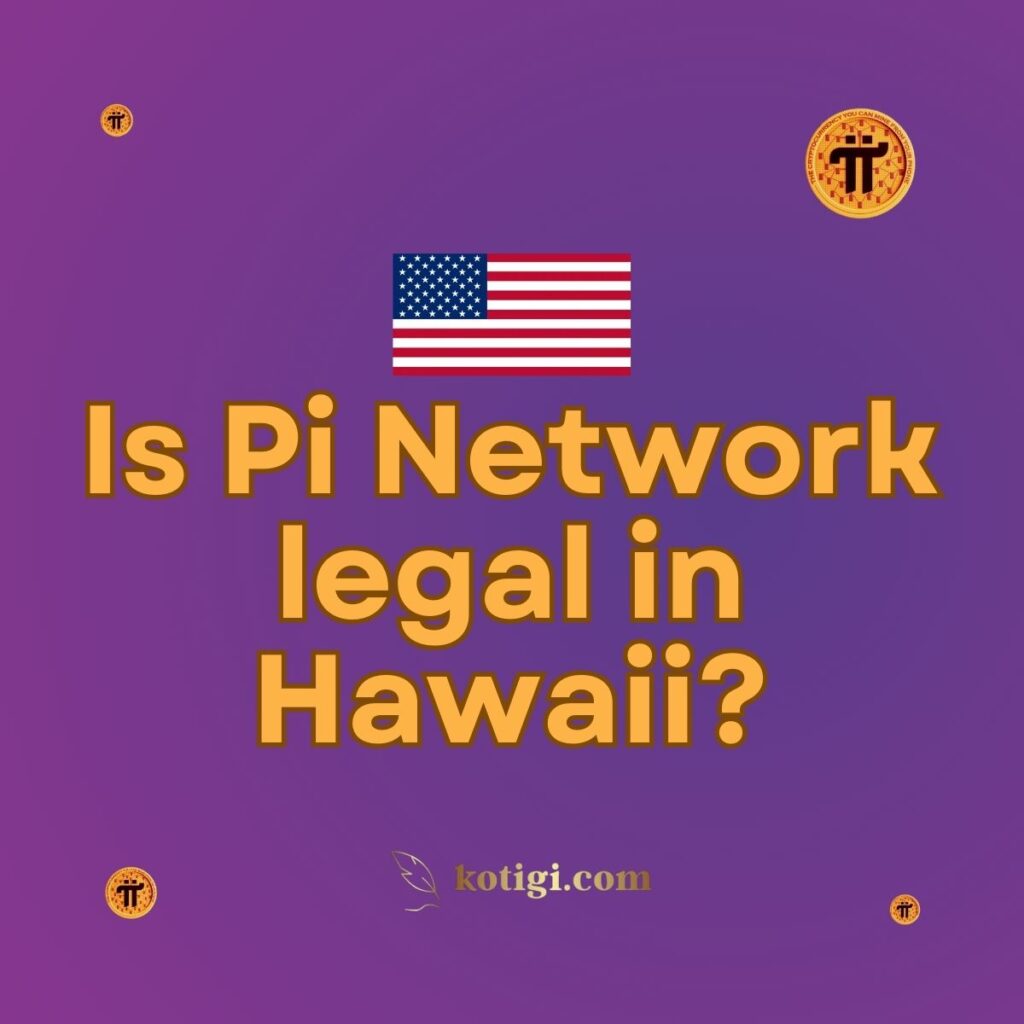
Is Pi Network legal in Hawaii?
Pi Network is currently legal in Hawaii. With no specific state laws targeting mobile-based mining or platforms like Pi Network, residents are free to participate as long as they adhere to federal regulations. Hawaii’s regulatory environment does require specific compliance from exchanges, but since Pi coins are not tradable, it faces fewer restrictions. Hawaii residents should, however, remain updated on both federal tax obligations and state developments as cryptocurrency regulations evolve.
Introduction
As the popularity of Pi Network grows, many residents of Hawaii wonder about its legality and regulatory implications. Hawaii has unique cryptocurrency regulations compared to other U.S. states, especially due to its strong consumer protection policies. Although Pi Network is legal to use, Hawaii’s complex stance on digital currencies requires a closer look for those considering participation in Pi’s mining process. This article discusses the current legal landscape for Pi Network in Hawaii, covering applicable federal and state regulations, user obligations, and Hawaii’s potential future stance on blockchain technology.
Overview of Hawaii’s Cryptocurrency Regulations
Hawaii’s Cryptocurrency Licensing Requirements
Hawaii is one of the few states with specific licensing requirements for cryptocurrency exchanges, requiring businesses dealing in cryptocurrency to obtain a Money Transmitter License and maintain reserves equal to the value of assets held. This mandate, enforced by the Division of Financial Institutions (DFI), has led to several cryptocurrency exchanges ceasing operations in Hawaii. However, because Pi Network does not facilitate direct trading of its tokens, it does not fall under these strict licensing regulations, making participation accessible for Hawaii residents.
Blockchain and Digital Asset Innovation
Despite these licensing requirements, Hawaii has shown interest in promoting blockchain technology, aiming to balance innovation with consumer protection. The Digital Currency Innovation Lab was launched in Hawaii to provide a temporary framework allowing digital currency companies to operate in the state while remaining in regulatory compliance. Although Pi Network is not currently integrated into the Lab’s structure, this program indicates Hawaii’s willingness to support blockchain innovations within a controlled environment.
Federal Regulations Affecting Pi Network in Hawaii
SEC Guidelines on Cryptocurrency
The Securities and Exchange Commission (SEC) plays a significant role in regulating cryptocurrency and blockchain technology across the United States. Since Pi coins are not yet tradeable and therefore lack a monetary value, the SEC does not currently classify them as securities. Hawaii residents can engage with Pi Network without worrying about SEC registration, although this could change if Pi coins become tradeable in the future.
IRS Requirements for Cryptocurrency Tax Reporting
The Internal Revenue Service (IRS) categorizes cryptocurrencies as property, meaning that any income, gain, or loss related to cryptocurrencies is subject to taxation. Currently, Pi Network is exempt from taxable events, as mined Pi coins lack value in external markets. However, Hawaii residents should maintain records of their mining activities and be prepared for future tax obligations if Pi coins are made tradable or if IRS guidelines change.
Consumer Protection and Security Considerations in Hawaii
Hawaii’s Consumer Protection Laws
Hawaii enforces strict consumer protection laws through the Hawaii Department of Commerce and Consumer Affairs (DCCA) to safeguard residents from deceptive or fraudulent practices. The state’s regulatory approach emphasizes transparency and security, which is relevant for Pi Network users in Hawaii. Should any concerns arise, Hawaii residents have the right to file complaints under state consumer protection laws.
Data Security for Pi Network Participants
Although Pi Network has not faced significant security threats, users are advised to take necessary steps to secure their accounts, particularly since the platform operates on mobile devices. By utilizing strong passwords and enabling two-factor authentication (2FA), Hawaii residents can safeguard their Pi accounts and comply with local data protection practices.
Economic and Business Potential for Pi Network in Hawaii
Hawaii’s Approach to Blockchain in Business
Hawaii has a budding tech ecosystem that increasingly incorporates blockchain technologies. With the emergence of blockchain initiatives and pilot programs, Hawaii is building a foundation for blockchain-enabled business models. Pi Network’s mobile mining system could integrate well with Hawaii’s blockchain efforts, potentially leading to opportunities for local business applications, such as digital loyalty programs or community engagement platforms.
Opportunities for Local Collaborations
While Pi Network’s coins are not yet tradeable, the platform has potential for forming partnerships with Hawaiian businesses interested in blockchain innovation. As digital adoption grows, Hawaii businesses may look to Pi Network as a resource for future blockchain projects, especially if Pi Network’s ecosystem expands to include applications beyond individual mining.
Environmental Impact and Sustainability
Hawaii’s Commitment to Sustainability
Hawaii is recognized for its environmental commitment and its reliance on sustainable energy sources. As cryptocurrency mining often consumes high levels of energy, Pi Network’s low-energy, mobile-based mining aligns well with Hawaii’s green initiatives. This sustainable mining model could appeal to environmentally conscious residents who seek to minimize their digital carbon footprint.
Benefits of Low-Energy Mobile Mining
Pi Network’s mobile mining technology is energy-efficient, using minimal resources compared to traditional cryptocurrency mining. For Hawaii residents, this environmentally friendly approach provides a way to participate in the digital currency space without contributing to the energy challenges that accompany more resource-intensive mining operations.
Educational Resources for Blockchain and Cryptocurrency in Hawaii
University Programs and Blockchain Research
Hawaii’s educational institutions, such as the University of Hawaii, offer blockchain research programs and courses aimed at developing an understanding of digital currencies. By participating in these programs, Pi Network users in Hawaii can gain insight into blockchain applications, legal considerations, and financial literacy, equipping them with the knowledge to make informed decisions.
Blockchain Events and Community Engagement
Hawaii’s blockchain community has seen growth, with events such as Hawaii Blockchain Summit bringing together enthusiasts and industry professionals. These events enable Pi Network participants to stay informed on cryptocurrency trends, regulatory updates, and potential applications, helping them navigate the evolving digital currency landscape in Hawaii.
Future Legal Outlook for Pi Network in Hawaii
Current Legal Status and Compliance
Pi Network is currently legal in Hawaii, with no specific restrictions prohibiting its use. The platform’s mobile mining process avoids the need for compliance with the state’s Money Transmitter License requirement, as no exchange of Pi tokens occurs. Hawaii residents can participate in Pi Network activities, provided they adhere to federal tax regulations.
Anticipated Changes in Hawaii’s Cryptocurrency Regulations
As blockchain adoption continues to grow, Hawaii may introduce new regulations to further refine its digital asset landscape. Future policies could address data privacy, cybersecurity, or consumer protections, impacting Pi Network only if the platform’s token becomes tradable. With a regulatory framework already in place for exchanges, Hawaii is likely to introduce further guidelines that support both innovation and consumer protection.
Conclusion
Pi Network is legal in Hawaii, benefiting from the state’s balanced approach to cryptocurrency. By following federal regulations set by the SEC and IRS, Hawaii residents can confidently participate in Pi Network’s mobile mining process without violating local laws. Hawaii’s emphasis on sustainability aligns well with Pi Network’s energy-efficient model, and the state’s evolving blockchain ecosystem suggests that future opportunities could emerge. Participants should stay informed about changes in both state and federal regulations to ensure compliance and safeguard their investments.
Key Takeaways
- Legal Status: Pi Network is currently legal in Hawaii, with no state regulations targeting its use.
- Federal Compliance: Hawaii participants must adhere to SEC and IRS guidelines to ensure compliance.
- Consumer Protection: Hawaii’s strict consumer protection laws offer residents a safeguard in the event of fraudulent activity.
- Business Potential: Hawaii’s growing blockchain ecosystem provides a favorable environment for Pi Network’s future applications.
- Environmental Alignment: Pi Network’s low-energy mining model complements Hawaii’s commitment to sustainability.
- Educational Resources: The state offers local university programs and blockchain events to enhance knowledge for Hawaii residents interested in cryptocurrency.





